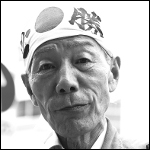Death by hanging not quick: data show
Hangings in Japan took 14 minutes on average in the 1940s and 1950s, according to documents recently found by a researcher, a finding that could prompt debate over the cruelty of executions.
Kenji Nagata, a penology expert, said it is the first time the number of minutes it takes to execute an inmate has been confirmed in official documents, noting the duration is likely to be the same today because no changes have been made to the method of execution.
According to Nagata, an associate professor at Kansai University, the English-language documents discovered in the National Diet Library contained legible records of 45 hangings from 1948 to 1951, when Japan was still under the Allied Occupation.
Hanging has been the execution method stipulated in the penal code since 1882 — a practice criticized by human rights groups in recent decades.
The recently discovered documents are "important for discussing the death penalty and the cruelty of execution by hanging," Nagata said.
The existence of the documents was widely known, but the Justice Ministry had not disclosed them despite requests. The ministry declined comment on the records found this time.
Nagata found the documents, believed to be copies of the original records collected by the Occupation authorities and now kept at the U.S. National Archives and Records Administration, in a microfiche stored at the library in Tokyo.
The documents show the start and end times of 46 executions between 1948 and 1951, but one record was illegible. The longest execution time was 21 minutes and the shortest was 10 minutes and 55 seconds. The average was 14 minutes and 17 seconds.
The documents include the names of the inmates and their family members, the nature of their crimes, dates of the rulings and scheduled dates and places of executions.
Nagata said the length of executions probably varied because the hanging rope sometimes did not get wrapped around the inmate's neck properly.
"I believe something similar could be happening even today, and we must consider whether executions that can't be carried out fairly are appropriate," he said.
| Hot Topics | |
|---|---|
Timing Death
9 posts
• Page 1 of 1
Re: Timing Death
I have a solution...
Don't do shit that put you on the death row...
(or in the USA: don't be black)
Don't do shit that put you on the death row...
(or in the USA: don't be black)
-

Coligny - Posts: 21824
- Images: 10
- Joined: Sat Jan 17, 2009 8:12 pm
- Location: Mostly big mouth and bad ideas...
Re: Timing Death
Coligny wrote:I have a solution...
Don't do shit that put you on the death row...
(or in the USA: don't be black)
That's a bit unfair. We don't execute people for being black in The US. We do it for being poor and black.
-

Samurai_Jerk - Maezumo
- Posts: 14387
- Joined: Mon Feb 09, 2004 7:11 am
- Location: Tokyo
Re: Timing Death
I think brown and poor is a more accurate description.
-

Christoff - Maezumo
- Posts: 828
- Joined: Wed Dec 13, 2006 4:00 am
- Location: Singapore Lor... Can? No can?
Re: Timing Death
Always thought that death by hanging was instantaneous, due to some broken bone in the neck. Why does it take a freaking 14 minutes on average?
This completely disqualifies hanging as punishment.
(not that I am in favor of the death penalty anyway...)
This completely disqualifies hanging as punishment.
(not that I am in favor of the death penalty anyway...)
-

Russell - Maezumo
- Posts: 8580
- Images: 1
- Joined: Fri Aug 13, 2010 11:51 pm
Re: Timing Death
Samurai_Jerk wrote:Coligny wrote:I have a solution...
Don't do shit that put you on the death row...
(or in the USA: don't be black)
That's a bit unfair. We don't execute people for being black in The US. We do it for being poor and black.
You, Merkins, always lacking subtlety. You earn the civilized world's wrath by perpetuating barbaric practices unleashed only against downtrodden minorities...
...in more thoughtful cuntries, not only do you take one of the world's harshest stances against capital punishment, you also show benevolence by providing everything needed when incarcerating underprivileged darkies...long periods without supervision, contact or communication, then a noose or something that easily acts as one. Why, I'll have you know that it even saves on the enormous costs of that pain-in-the-fucken-arse appellate process (where them uppity folks get to complain all about how they didn't get treated fair and all that other tripe).
-

Screwed-down Hairdo - Maezumo
- Posts: 6722
- Joined: Wed May 20, 2009 7:03 pm
Re: Timing Death
Coligny wrote:I have a solution...
Don't do shit that put you on the death row...
Also don't be in the wrong place at the wrong time presenting an "easy" solution for a particular case...
-

yanpa - Posts: 5671
- Images: 11
- Joined: Sun Nov 04, 2007 11:50 am
- Location: Tokyo
Re: Timing Death
Coligny wrote:I have a solution...
Don't do shit that put you on the death row...
(or in the USA: don't be black)
Or in Japan, don't get beaten and coerced by the keiji when you're incarcerated for weeks on end.
-

gaijinpunch - Maezumo
- Posts: 766
- Joined: Sat Nov 06, 2010 10:40 am
Re: Timing Death
So the bloke who took 10 minutes to die is the one that was well hung?
- Mock Cockpit
- Maezumo
- Posts: 700
- Joined: Sun Mar 23, 2008 9:58 pm
9 posts
• Page 1 of 1
Who is online
Users browsing this forum: Google [Bot] and 2 guests

